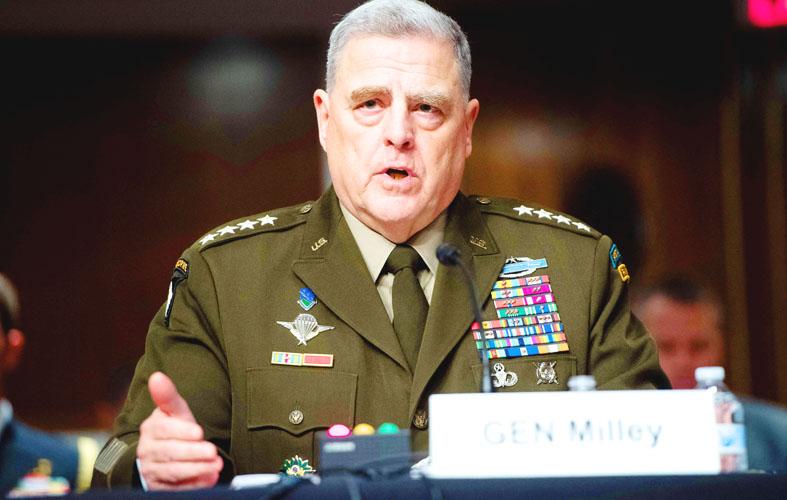Making Taiwan a “very difficult objective to take” is the nation’s best defense strategy, and the US can help as it has with Ukraine against Russia, US Joint Chiefs of Staff Chairman General Mark Milley said on Thursday.
“Taiwan is a defensible island. We just need to help the Taiwanese to defend it a little bit better,” Milley told a US Senate Armed Services Committee budget hearing.
He was responding to a question from US Senator Rick Scott on whether proposed military spending for next year was enough to deter a Chinese military attack.

Photo: AFP
Milley said that “the best defense of Taiwan is done by the Taiwanese” with US support, and that the key to deterrence was to “make sure that the Chinese know that if they were to attack Taiwan, it’s a very, very difficult objective to take.”
China has observed several lessons in Russia’s invasion of Ukraine, including the challenges of conducting an amphibious or air assault on Taiwan with its millions of people, Milley said.
In his written testimony, Milley said that China is continuing to develop significant nuclear, space, cyber, land, air and maritime military capabilities, and that “they are working every day to close the technology gap with the US and its allies.”
“In short, they remain intent on fundamentally revising the global international order in their favor by mid-century, they intend to be a military peer of the US by 2035 and they intend to develop the military capabilities to seize Taiwan by 2027,” Milley said.
Also responding to a question asked by Scott, US Secretary of Defense Lloyd Austin defended the Pentagon’s spending proposal, saying its focus on investments in technology, cyberspace and undersea capabilities would help with deterring China and confronting the existing challenge of Russia.
He said the US considered China to be “a now and forever problem in terms of a challenge” that would evolve.

Conflict with Taiwan could leave China with “massive economic disruption, catastrophic military losses, significant social unrest, and devastating sanctions,” a US think tank said in a report released on Monday. The German Marshall Fund released a report titled If China Attacks Taiwan: The Consequences for China of “Minor Conflict” and “Major War” Scenarios. The report details the “massive” economic, military, social and international costs to China in the event of a minor conflict or major war with Taiwan, estimating that the Chinese People’s Liberation Army (PLA) could sustain losses of more than half of its active-duty ground forces, including 100,000 troops. Understanding Chinese

The Ministry of Foreign Affairs (MOFA) yesterday said it is closely monitoring developments in Venezuela, and would continue to cooperate with democratic allies and work together for regional and global security, stability, and prosperity. The remarks came after the US on Saturday launched a series of airstrikes in Venezuela and kidnapped Venezuelan President Nicolas Maduro, who was later flown to New York along with his wife. The pair face US charges related to drug trafficking and alleged cooperation with gangs designated as terrorist organizations. Maduro has denied the allegations. The ministry said that it is closely monitoring the political and economic situation

UNRELENTING: China attempted cyberattacks on Taiwan’s critical infrastructure 2.63 million times per day last year, up from 1.23 million in 2023, the NSB said China’s cyberarmy has long engaged in cyberattacks against Taiwan’s critical infrastructure, employing diverse and evolving tactics, the National Security Bureau (NSB) said yesterday, adding that cyberattacks on critical energy infrastructure last year increased 10-fold compared with the previous year. The NSB yesterday released a report titled Analysis on China’s Cyber Threats to Taiwan’s Critical Infrastructure in 2025, outlining the number of cyberattacks, major tactics and hacker groups. Taiwan’s national intelligence community identified a large number of cybersecurity incidents last year, the bureau said in a statement. China’s cyberarmy last year launched an average of 2.63 million intrusion attempts per day targeting Taiwan’s critical

AGING: As of last month, people aged 65 or older accounted for 20.06 percent of the total population and the number of couples who got married fell by 18,685 from 2024 Taiwan has surpassed South Korea as the country least willing to have children, with an annual crude birthrate of 4.62 per 1,000 people, Ministry of the Interior data showed yesterday. The nation was previously ranked the second-lowest country in terms of total fertility rate, or the average number of children a woman has in her lifetime. However, South Korea’s fertility rate began to recover from 2023, with total fertility rate rising from 0.72 and estimated to reach 0.82 to 0.85 by last year, and the crude birthrate projected at 6.7 per 1,000 people. Japan’s crude birthrate was projected to fall below six,